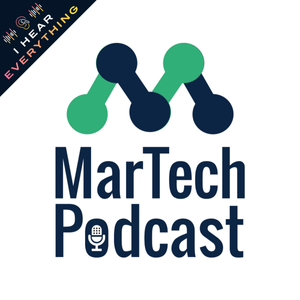
The Future of Frontline Work
03/15/23 • 22 min
This episode explores:
- Reasons behind the emphasis on frontline workers right now (1:00)
- How chief supply chain officers (CSCOs) can juggle frontline work challenges and approach redesigning the frontline workforce at their organizations (2:18)
- How CSCOs design their frontline workforces depending on their appetite for change, and whether they view their workforce as a tool or a cornerstone (5:45)
- The different futures of the frontline workforce, with insight from real-world examples (7:30)
- Recommendations for CSCOs on the future of frontline work (20:05)
Host Caroline Chumakov and guest Emily Rose McRae discuss the call to action for redesigning frontline work and what the human-technology interface should look like for frontline employees going forward.
Many CSCOs recognize the need to augment their frontline workforces and to deal with the frontline talent shortage but are unsure of the right approach to take when redesigning frontline work. Emily Rose walks through four potential futures of frontline work and shares examples of the human-technology relationship in each.
Emily Rose McRae leads the Future of Work and Talent Analytics research teams in Gartner’s HR practice. While Emily Rose works across all issues that can lead to the future of work, her core areas of focus include emerging technologies and their impact on work and the workforce, new employment models, market and demographic shifts, and workforce planning to anticipate and prepare for these changes. Prior to joining Gartner, Emily Rose worked in management consulting and international development, providing data science support to U.S. government loan programs and microfinance projects in Fiji and Tonga.
This episode explores:
- Reasons behind the emphasis on frontline workers right now (1:00)
- How chief supply chain officers (CSCOs) can juggle frontline work challenges and approach redesigning the frontline workforce at their organizations (2:18)
- How CSCOs design their frontline workforces depending on their appetite for change, and whether they view their workforce as a tool or a cornerstone (5:45)
- The different futures of the frontline workforce, with insight from real-world examples (7:30)
- Recommendations for CSCOs on the future of frontline work (20:05)
Host Caroline Chumakov and guest Emily Rose McRae discuss the call to action for redesigning frontline work and what the human-technology interface should look like for frontline employees going forward.
Many CSCOs recognize the need to augment their frontline workforces and to deal with the frontline talent shortage but are unsure of the right approach to take when redesigning frontline work. Emily Rose walks through four potential futures of frontline work and shares examples of the human-technology relationship in each.
Emily Rose McRae leads the Future of Work and Talent Analytics research teams in Gartner’s HR practice. While Emily Rose works across all issues that can lead to the future of work, her core areas of focus include emerging technologies and their impact on work and the workforce, new employment models, market and demographic shifts, and workforce planning to anticipate and prepare for these changes. Prior to joining Gartner, Emily Rose worked in management consulting and international development, providing data science support to U.S. government loan programs and microfinance projects in Fiji and Tonga.
Previous Episode

Delivering Business Impact Through Supply Chain Innovation, With Eric O’Daffer
In this podcast, host Thomas O’Connor and guest Eric O’Daffer explore the current state of innovations in supply chain-driven organizations through the lens of Gartner’s 2023 Power of the Profession Supply Chain Awards.
They discuss the Power of the Profession winners and highlight the major themes in supply chain innovations, but also focus intently on how small and mid-cap organizations can drive business value from their innovation efforts. Eric advises supply chain leaders on where to begin their innovation journeys, and how to systematize innovation.
Eric O’Daffer is a VP Analyst in the Gartner Healthcare Supply Chain group. His concentration is on the end-to-end healthcare supply chain, starting at the point of patient care and looking back. He focuses most of his time with providers, examining how they best manage all the components of their supply chains. This involves both their internal processes, as well as best practices for partnering with their suppliers to optimize patient outcomes at the best-delivered cost possible.
99% Perspiration — Eyewitness to Supply Chain Innovation by Eric O’Daffer
Blog is front of paywall and accessible to clients/non-clients.
Next Episode

From Novel Idea to Innovative Execution at Scale, With Pfizer’s Jim Cafone
Host Thomas O’Connor and guest Jim Cafone, Senior Vice President of Global Supply Chain for Pfizer, discuss how supply chain leaders can take ideas for supply chain innovation from their nascent, early stages into large-scale execution.
Jim shares his wealth of innovation experience with Pfizer, including how the organization affects change within its supply chain and the benefits of a “horizontal mindset” for supply chain leaders. He also provides specific examples of these principles in practice, such as Pfizer’s approach to its “An Accord for a Healthier World” initiative.
- Innovation: Building from ideas to execution at scale. (1:56)
- Driving innovation at Pfizer through the “An Accord for a Healthier World” initiative. (3:55)
- What does innovation-related change look like for supply chain operations? (7:43)
- The importance of sharing successful and valuable innovation across the world of supply chain. (13:48)
- Advice for supply chain leaders looking to drive more value from innovation programs in their organizations. (17:10)
Jim Cafone has been with Pfizer since 2010. In his current role as Senior Vice President of Global Supply Chain, he oversees Pfizer’s global demand forecasting, demand and supply planning, worldwide logistics, and inventory management. In his previous role with Pfizer as Vice President of Network Design and Performance, Jim was responsible for business development, supply chain network design, Pfizer’s lean production system, all performance reporting and analytics, innovation, and recognition programs.
If you like this episode you’ll love
Episode Comments
Generate a badge
Get a badge for your website that links back to this episode
<a href="https://goodpods.com/podcasts/the-gartner-supply-chain-podcast-303489/the-future-of-frontline-work-42601697"> <img src="https://storage.googleapis.com/goodpods-images-bucket/badges/generic-badge-1.svg" alt="listen to the future of frontline work on goodpods" style="width: 225px" /> </a>
Copy




